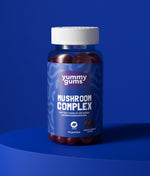Hormone balance for women
Lifestyle
From regulating the menstrual cycle to their influence on mood and fertility, hormones play a vital role in our daily lives. But how does this actually work, and what happens when your hormones are out of balance? We'll tell you all the ins and outs.
What do hormones do?
Hormones act like messengers traveling through your body. They are produced by specialized glands and circulate in your bloodstream to coordinate tasks. Your hormones send specific signals to your organs to speed up, slow down, or stop. In this way, hormones regulate all sorts of important processes in your body.
Every body contains hormones, and the hormone balance, also known as the amount of hormones in your body, varies by gender and age. Women generally have higher levels of estrogen and progesterone and lower levels of testosterone. In men, this is reversed; their bodies contain more testosterone than estrogen and progesterone.
Female hormones by life stage
The amount of each hormone in your body varies by gender and by life stage. This is clearly evident during puberty, for example, when concentrations of certain hormones are higher. This affects anger, sexual desire, anxiety, joy, and sadness. When hormone concentrations change, it almost always affects your mood, because many processes take place in the brain. Another stage of life where hormone balance changes significantly is during menopause.
Hormones during the menstrual cycle
The average cycle lasts between 21 and 35 days. This period can be divided into four distinct "seasons." These seasons are determined by the hormone levels in your body.
Winter – Menstruation: Similar to the calm winter days, menstruation represents a time of renewal and repair, as the body prepares for a new cycle by eliminating unused elements. During this time, estrogen and progesterone levels drop to their lowest point in your cycle.
Spring – Pre-ovulation: After winter comes spring, a period of growth and renewed energy. For example, after menstruation, the pre-ovulation period begins, during which the body prepares for potential fertility and new life. During this time, estrogen levels increase again, you feel more energetic, and you often experience increased sexual energy.
Summer – Ovulation: Just as summer is full of warm days and fertility, ovulation represents the peak of fertility, primed for the possibility of conception. During this time, your hormones are extremely active. The hormones follicle, estrogen, LH, and testosterone rise.
Autumn – Premenstruation: After summer comes autumn with its changing colors and preparations for winter. During premenstruation, the body prepares for a new cycle, sometimes accompanied by physical and emotional adjustments. During this period, estrogen levels gradually decrease, making you feel less energetic and more likely to become grumpy.
What types of hormones do women have?
The five main hormones women produce are FSH, LH, prolactin, estradiol, and progesterone. FSH and LH play a crucial role in regulating ovulation and the development of ovarian follicles. Prolactin affects the mammary glands and can suppress LH, FSH, and estrogen to influence the natural menstrual cycle. Estradiol is an essential hormone in women, while progesterone is involved in the formation of the uterine lining.
How do you know if your hormones are out of balance? (symptoms)
A hormonal imbalance occurs when there's a disruption in your natural hormone balance. While it's difficult to diagnose an imbalance yourself, there are several symptoms that can indicate it.
- Fatigue
- Rapid mood swings
- Very hungry or not at all
- Anxious and/or depressed feelings
- Irregular cycle
- Acne
- Bladder infections
- Concentration problems
- Weight gain or loss
- Decreased libido
- Stiff muscles
- Hair loss
- Headache
During menopause, other symptoms may also appear, such as hot flashes and night sweats.
If you're experiencing one or more symptoms and suspect you have a hormonal imbalance, it's best to contact your doctor. They can test this with a blood test or saliva test and help you determine the underlying cause.
How do your hormones get out of balance? (causes)
A hormonal imbalance can have multiple causes, but it often comes down to three main factors: diet, chronic stress, and exercise. We'll explain them in more detail below.
- Power supply
Healthy eating is important for your mental and physical health. Hormones benefit from this as well. When you ensure you get the right nutrients, you ensure your body functions properly.
- Chronic stress
When you experience a lot of pressure or stress for an extended period, we call it chronic stress. This is detrimental to your physical and mental well-being. Chronic stress often results in an excess of cortisol in your body. Cortisol ensures that everything you don't need for survival is suppressed. Too much of this hormone can affect your digestion, metabolism, muscle building and recovery, and can even impact your sleep.
- Sports
Every type of sport or workout has a different effect on your hormones. Finding the right way is important because hormones have a major impact on your muscle growth. For example, some workouts cause more muscle breakdown than others due to cortisol production. Also, some workouts release more testosterone and growth hormone than others, which affects your muscle growth.
How to keep your hormones balanced? (solutions)
Balancing your hormones or keeping your hormones balanced may sound like a huge task, but there are a number of things you can easily do yourself.
Food for hormonal imbalance
A healthy body starts with a healthy diet. Make sure you get enough minerals and vitamins, eat at least two servings of fruit and 300 to 400 grams of vegetables every day, eat as much unprocessed food as possible, and drink plenty of water.
Stress-free for a healthy hormonal balance
Are you experiencing persistent stress? Then it's a good idea to clearly identify the source of this and what you can do about it. Can you handle everything yourself, or do you need help from someone you know, or perhaps even a professional? Make sure you schedule moments for yourself where you can simply relax and unwind.
Exercise plan based on hormonal goals
To figure out which types of workouts are good for your hormones and which aren't, you can consider workouts that align with your cycle. For example, during the winter phase, it's helpful to exercise moderately to prevent stress. Many women enjoy strength training during the spring phase. Their pain tolerance is often higher, allowing them to keep going longer. The summer phase is the ultimate time to break records. Your energy levels are often at their highest during this period. In the autumn phase, your energy levels drop again, and during this phase, you can focus your workouts more on technique and movement efficiency. Yoga, for example, is a popular activity during this phase.
It's important to always pay attention to how your body responds to training and how much energy you need. If you find it difficult to determine this yourself, consider talking to an expert.
Could you use some extra support for your hormones? Yummygums Balance is new. A vitamin gummy with B6¹, sage², evening primrose oil, chasteberry, and a delicious blackberry flavor. Sage supports normal menstruation and helps with mood swings*. Vitamin B6 contributes to the regulation of hormonal activity. It also helps with menopausal symptoms²*.
*Health claims pending European approval.




































